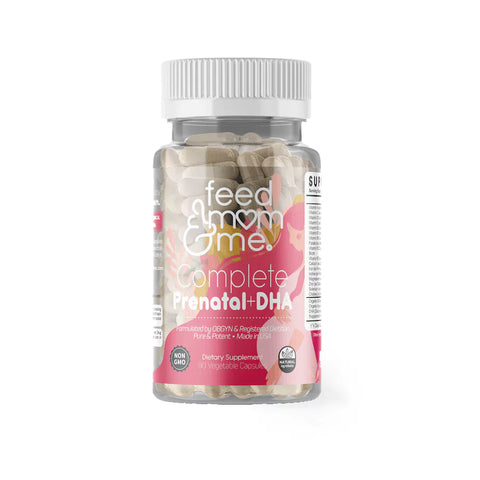Home Remedies For A Cold & Cough During Pregnancy
Published:Updated:

Medically Reviewed by Dr. Nicole Palmer, DO
Having a cold or cough is never fun. They can be extremely uncomfortable during pregnancy when you aren’t able to safely take over-the-counter medications to help you with cold relief. This leaves you having to wait out the span of the cold, using home remedies to relieve your symptoms.
The common cold is referred to as a viral upper respiratory tract infection that affects your wellbeing. Symptoms of the common cold may include cough, sore throat, nasal congestion, runny nose, and sneezing. There isn’t an established antidote for a cold, unlike bacterial infections that can be cured by antibiotics.
Check out these natural remedies to help with a cold while pregnant.
DOES THE COMMON COLD, FLU, AND COUGH DURING PREGNANCY AFFECT THE BABY?
Thankfully, expecting mothers can rest assured that the womb is beyond the reach of the virus and that their baby is safely protected. Your immune system, uterus, and amniotic fluid all play a vital role in protecting your baby. Consider them your superhero in disguise that has your back when it comes to your pregnancy health!
The immune system cannot distinguish the difference between a fetus or a virus. Its main function is to target anything that is perceived as a foreign entity by sending a super load of antibodies to attack the entity. During pregnancy, the woman’s immune system diminishes its defense mechanism to prevent harm to the growing fetus. By the same token, this will also make you more susceptible to contracting cold virus during pregnancy, coughs, and even the flu.
The muscle of the uterus serves as a protective barrier for the developing baby. It is believed that the uterine lining, which is abundant in immune cells, may help shield the developing fetus from infections.
One of the impressive defenses in amniotic fluid is the presence of antimicrobial peptides. These tiny powerhouses have the ability to either kill or neutralize harmful pathogens that may try to harm your baby. They are like the mighty knights warding off intruders!
But that's not all! The amniotic fluid and placenta also house immune cells that are super-smart. They can detect and respond to invaders, ensuring that your baby's body remains safe and protected during their time in the womb. Think of these immune cells as vigilant guards, constantly on the lookout for any unwanted guests.
WHAT SYMPTOMS REQUIRE A DOCTOR'S VISIT FOR A COLD DURING PREGNANCY?
The cold symptoms tend to persist for 10–14 days, and the downside is that just as you are on your way to full recovery, the viral infection might make a comeback. If you suspect that the symptoms are getting progressively worse or notice no sign of recuperation even after 2 weeks, you might want to fill your doctor in about your condition. Flu-like symptoms, on the other, should be reported to your healthcare provider right away.
THE WORRISOME SYMPTOMS INCLUDE:
- Fever (temperature more than 100.4 F)
- Chills
- Difficulty breathing
- Dizziness
- Confusion
- Severe vomiting
HOW TO PREVENT COLDS WHILE PREGNANT?
You may have noticed that your immune system behaves differently during pregnancy. This is due to your body's remarkable ability to prioritize the health and safety of your growing baby, which may sometimes weaken your own immune defenses, making a cold or cough somewhat unavoidable.
It's important to keep this in mind and take extra precautions to protect yourself and your baby.
HOW TO PREVENT COLDS:- Wash your hands often with warm water and soap, especially before eating and touching your face.
- Try to keep your distance from anyone who has a cold or a cough.
- Avoid touching your face, especially your nose and mouth where germs can easily enter your body.
- Avoid sharing any cutlery, drinks, and utensils with someone who has a cold.
- Eating a healthy diet with lots of vegetables, fruits, protein, and healthy fats, helps aid a strong immune system.
- Drink lots of liquids throughout the day. , at least one cup every 3 hours.
- Exercising frequently helps keep your immune system strong.
- Staying hydrated throughout the day helps you naturally eliminate bacterias and toxins that cause infections in your body.
Fun fact: Did you know that some studies suggest that babies may get a "head start" in building their immune systems while in the womb? This is because they are exposed to various germs and substances that can help stimulate their immune system development!
Check out these natural remedies to help with a cold while pregnant. Tips to prevent cold and cough in pregnancy
1. STAY HYDRATED
A sore throat might make it difficult to drink water while dealing with a cold. It is important to keep your body suitably hydrated for your health and your baby’s health. Staying hydrated helps dilute secretions, thinning out mucus, and reducing congestion.
Tips to stay hydrated:
- Drink lukewarm water. Aim to drink at least 8 to 12 cups of water a day for proper hydration.
- You can also drink Ginger tea mixed with lemon and raw honey.
- Vegetable soup, clear broths, and fruit juices help soothe your symptoms and maintain hydration.

2. TAKE A PRENATAL VITAMIN
Prenatal Vitamins are filled with nutrients and minerals like vitamin C, which enhances your body’s natural immune response of disease-fighting antioxidants to fight off the infection. A daily prenatal vitamin is also packed with immune-boosting ingredients like Vitamin A, Vitamin D, Vitamin E, Iron, Selenium, and Zinc.
You can also boost your immune system through foods high in Vitamin A, Vitamin D, Vitamin E, Iron, Selenium, and Zinc like carrots, mangos, cantaloupes, strawberries, brussels sprouts, bell peppers, pumpkin seeds, almonds, collard greens, lentils, cooked spinach, and asparagus.
For more information on prenatal vitamins, please check out our Benefits of Feed Mom & Me Complete Prenatal with DHA Multivitamin Blog. You got this mama, you and your little one are going to thrive!

3. HOMEMADE CHICKEN SOUP
Chicken soup is not just an old wives' tale, it is rich in nutrients and vitamins that help fight the infection attacking your immune system and it also contains anti-inflammatory properties. Packed with vitamins A and C, magnesium, phosphorus, gelatin, and antioxidants it provides health benefits that support the immune system to fight off viruses and the hot water helps at thinning mucus. (Relieving you from the sniffles!) Also contains sodium and potassium to help maintain your electrolyte balance and keep you hydrated. You still need to drink other fluids to stay hydrated while sick.
4. PINEAPPLE JUICE
Pineapple juice contains a strong anti-inflammatory property called bromelain. This enzyme helps with respiratory problems by calming a cough due to a cold and helps soothe a sore throat. It may also help break up and expel mucus. It is also important to drink plenty of water to assist in breaking up mucus and expelling it out of your body.
During pregnancy, pineapple juice is an excellent natural cough suppressant. Here are some pineapple cough recipes.
TRADITIONAL PINEAPPLE COUGH REMEDYThe most common pineapple juice remedy uses a few simple ingredients.
TO MAKE THIS TRADITIONAL PINEAPPLE COUGH REMEDY AT HOME, COMBINE:- 1 cup pineapple juice
- pinch of salt
- pinch of pepper
- 1 1/2 tbsp honey
Those who recommend taking this remedy advise drinking a 1/4 cup up to three times per day.
PINEAPPLE COUGH REMEDY WITH A KICKThis recipe builds on the traditional pineapple cough remedy mixture with the addition of cayenne pepper and ginger for a spicy kick.
TO MAKE THIS REMEDY AT HOME, MIX THE FOLLOWING INGREDIENTS IN A BLENDER:- 1 cup pineapple juice
- pinch of salt
- pinch of pepper
- 1 1/2 tbsp honey
- 3 inches ginger root
- 1/4 cup lemon juice
- 1/2 tsp cayenne pepper
As with the traditional version, those who recommend taking this remedy advise drinking a 1/4 cup up to three times per day.
5. HUMIDIFIER
Fall, winter, and spring are notorious for the common cold, especially when you’re pregnant and not able to take your usual OTC’s. The cold temperatures, low humidity, and dry heat from heaters can make you feel extremely stuffy and dry. This is when a humidifier becomes your new bestie.
During pregnancy, one of the best things to help you with a cold and cough is a humidifier. It helps raise (or maintain) the humidity levels by adding moisture to the air it’s located in. This provides temporary relief to your stuffy nose, cough, and helps to thin mucus. You should add a humidifier in the room you hang out in while sick and your bedroom at night. Helping you add as much moisture to your skin as possible.
Some humidifiers allow you to add a few drops of essential oil, such as peppermint, menthol, or tea tree oil, to enhance the (humidifier) soothing effects.
CAUTION: BE SURE TO CLEAN THE HUMIDIFIER REGULARLY, AND USE DISTILLED WATER TO PREVENT THE GROWTH OF MICROBES AND MOLD.
6. GINGER
Ginger has been used as a herbal remedy for centuries to treat numerous ailments, such as colds, sore throat and nausea. Containing compounds called gingerols and shogaols, it is considered an antibacterial, antiviral, anti-inflammatory, and antioxidant. Ginger is becoming more preferable for pregnant women as a remedy as there aren’t any health risks to them or their child and is beneficial for morning sickness.
For more on ginger, check out our blog, The Benefits Of Ginger During Pregnancy.
TIPS FOR CONSUMING GINGER:- Try chewing a small piece of ginger sprinkled with sea salt two to three times per day.
- Add 1 tablespoon of grated ginger to 1½ cup of water. Boil and then let it simmer for 10 minutes. Strain and add honey and lemon juice. Drink this herbal tea no more than three times per day.
7. BED REST
Resting with a cold during pregnancy can seem impossible being unable to breathe and are coughing throughout the night. Rest is one of the best ways to give your body the time and energy to fight off the infection.
As Daniel Neides, the medical director at The Wall Street Journal explains "One thing I tell patients is, for every one day you're down with an infection, it takes three days to recover," Dr. Neides adds
So the next time you’re feeling under the weather, take those days off for bed rest and ease back to your normal routine.
TIPS TO HELP REST:- Try to go to bed earlier than usual to get more sleep in.
- To help you breathe easily and reduce nasal drip try to elevate your head with pillows.
8. TURMERIC
Like ginger, turmeric has been used as a herbal remedy for centuries to treat numerous ailments, such as colds, coughs, and nasal inflammation. Turmeric's main active ingredient is curcumin, a powerful anti-inflammatory, and a very strong antioxidant. It is known to support your immune system, helping your body fight viruses.
Turmeric together with ginger can help decrease levels of inflammation, which can aid in improving your immune functions. There are many people that take this combination at the first sign of sickness.
TIPS FOR CONSUMING TURMERIC:- Warm-up a glass of milk and add 1 teaspoon of turmeric powder and a little crushed black pepper. Try drinking this twice daily while sick.
- Warm-up a glass of water and add ½ teaspoon each of turmeric powder and salt, mix them well. Gargle mixture twice a day to relieve a sore throat.
CAUTION: AS LONG AS TURMERIC IS CONSUMED AS A SPICE TO SEASON FOOD IT IS SAFE FOR A PREGNANT WOMAN. TURMERIC SUPPLEMENTS OR USING THE SPICE AS A TYPE OF ALTERNATIVE MEDICINE DURING PREGNANCY ARE COMPLETELY OFF-LIMITS. IN ANY CASES OF ANY PRE-EXISTING ALLERGIES TO TURMERIC, IT’S BEST THAT YOU STEER CLEAR OF USING THIS REMEDY.
9. SALTWATER
A sore throat is a painful thing to deal with during pregnancy. With every swallow, a burning sensation lingers, making your day quite miserable. Saltwater is one of those remedies you are going to love! You might’ve heard of gargling with warm salt water to soothe your sore throat. But does it actually work?
As it turns out, this remedy actually does provide relief. Sorana Segal-Maurer, MD, chief of the Dr. James J. Rahal Jr. The Division of Infectious Disease at New York Hospital Queens has stated, "You’re creating a high-salt barrier and you’re pulling out a lot of fluids from the tissues in the throat area, so you’re washing the virus out. The salt functions as a magnet for water. It’s good for symptomatic relief.”
TIPS FOR SALTWATER:- Add salt to warm water and gargle two or three times a day for sore throat relief.
10. APPLE CIDER VINEGAR
Apple cider vinegar is a very useful remedy to help cure a common cold. It contains good bacteria to help fight infections and alkalinizes the body creating a hostile environment for viruses to thrive on. This can help your body defeat a cold as soon as you feel your first symptom.
TIPS FOR CONSUMING APPLE CIDER VINEGAR:- Mix a spoonful of apple cider vinegar with a glass of warm water. Preferably, gargle, and then gulp the solution to achieve maximum benefits. Consume this combination twice a day.
- //feedmomandme.com/blogs/mama-blog/benefits-of-prenatal-vitamins
- //feedmomandme.com/products/complete-prenatal-vitamin-with-dha
- //feedmomandme.com/blogs/mama-blog/ginger-during-pregnancy
- www.wsj.com/articles/fighting-the-flu-when-you-need-to-stay-home-and-in-bed-1423504355
- www.webmd.com/cold-and-flu/features/does-gargling-wlth-salt-water-ease-a-sore-throat
- https://americanpregnancy.org/healthy-pregnancy/pregnancy-complications/cough-cold-during-pregnancy/
- N, Taşin A, Köse M. Amniotic fluid and ascending intrauterine infections. J Matern Fetal Neonatal Med. 2018;31(22):3076-3084.
- N, Ganio EA, Mcilwain D, et al. An Immune Clock of Human Pregnancy. Sci Immunol 2017; 2(15):eaan2946
- Racicot K, Cardenas I, Wünsche V, Aldo P, Guller S, Means R, Romero R, Mor G. Viral Infection of the Placenta Leads to Fetal Inflammation and Sensitization to Bacterial Products Predisposing to Preterm Labor. J Immunol 2014;192: 5929–5935. doi: 10.4049/jimmunol.1400198
